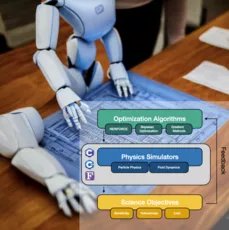ADOPT: AI-Driven Design Optimization with Physics Simulators
Results of this project will be shown here by the end of September 2023
- Sponsored by: ORIGINS EXCELLENCE CLUSTER, TUM Professorship of Data Science in Physics, TUM Chair for Experimental Physics with Cosmic Particles and TUM Chair for Aerodynamics and Fluid Mechanics
- Project Lead: Dr. Ricardo Acevedo Cabra
- Scientific Lead: Prof.Dr. Lukas Heinrich, Dr. Christian Haack and Ludger Paehler
- TUM Co-Mentor: TBA
- Term: Summer semester 2023
- Application deadline 29.01.2023
Apply to this project here

Could future AI systems be helpful in developing hardware designs to learn about fundamental properties of nature, such as dark matter? This question lies at the core of this project. The advent of deep learning has proven that gradient-based optimization in very high-dimensional configuration spaces is feasible and may produce novel solutions. Recently these approaches have been extended to more general optimization problems through the methods of differentiable and probabilistic programming. In the natural
sciences a fundamental question is what the optimal design of the experimental apparatus itself is. How should sensors be shaped? Where should they be placed in order to achieve an optimal scientific measurement under competing constraints such as material usage? How should physical environments be shaped to optimize fluid flow characteristics? To find such an optimal design it is imperative to combine Machine Learning and state-of-the art physics simulations such as those found in computational fluid dynamics or particle physics. Starting with simple particle physics and computational fluid dynamics configurations we will develop a modular Python package with standard interfaces to existing scientific simulators and optimization algorithms. The project will teach students first-hand about the design of Python packages for the sciences, provide experience in handling large-scale scientific simulators used in fundamental physics applications and the use of techniques such as the gradient-based optimization through stochastic processes with e.g. reinforcement learning.
Goals and Methods
The goal of this project is to develop a Python package which implements multiple methods of design optimization for reinforcement learning environments being constructed from particle physics, and computational fluids dynamics simulations. For this we orient ourselves on multiple current reinforcement learning environments [4, 5, 6], and utilize modern distributed frameworks such as Ray, and Dask. The core tenets and implicit learning goals are: Modern design of scientific Python packages with clean re-usable APIs
Utilization of distributed computation, and orchestration of parallelized simulators to construct highly expressive reinforcement learning environments Construction of design optimization problems with reinforcement learning applicable across scientific domains such as particle physics, and computational fluid dynamics
Tools
Technical Stack: PyTorch, PyBind 11, Dask, Ray, Envpool, Jax, Pyro
Important notice
Accepted students to this project should attend online workshops at the LRZ in April 2023 before the semester starts, unless they have proven knowledge. More information will be provided to students accepted to this project.